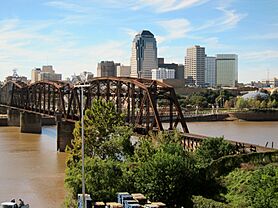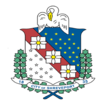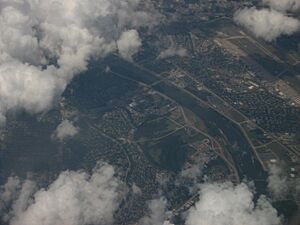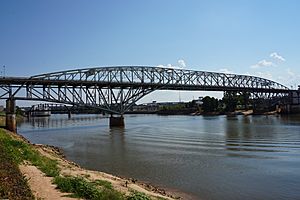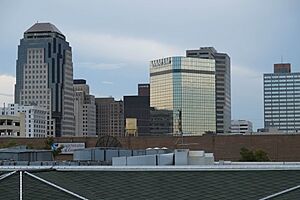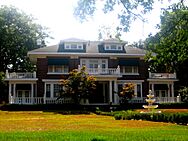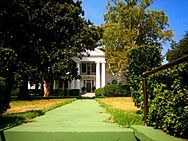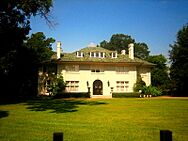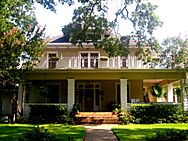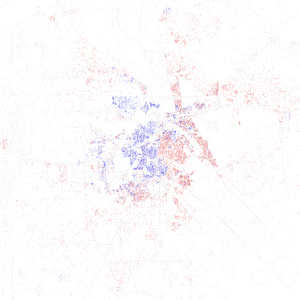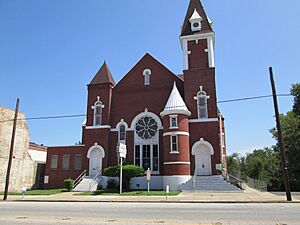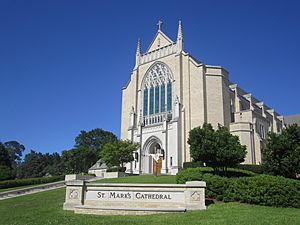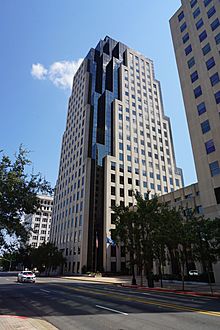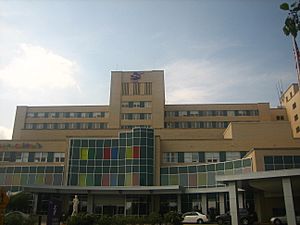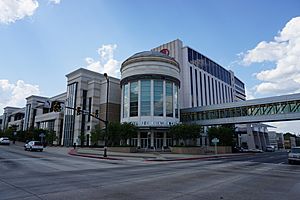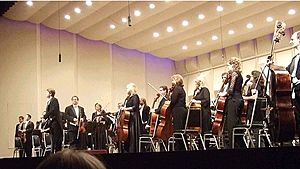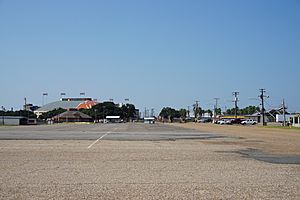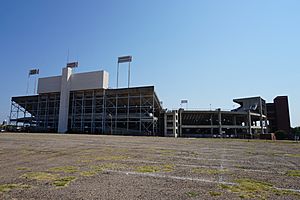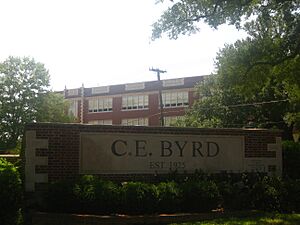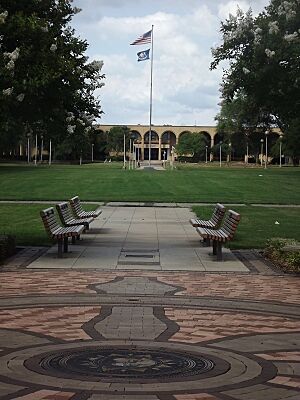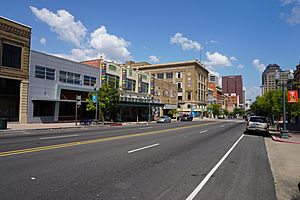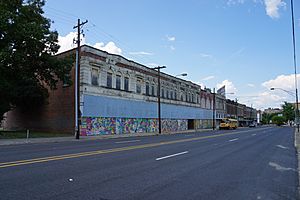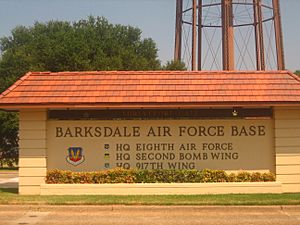Shreveport, Louisiana facts for kids
Quick facts for kids
Shreveport
|
|||||
|---|---|---|---|---|---|
|
Downtown
Holy Trinity Catholic Church
Shreveport Convention Center
Caddo Parish Courthouse
|
|||||
|
|||||
| Country | |||||
| State | Louisiana | ||||
| Parishes | Caddo, Bossier | ||||
| Founded | 1836 | ||||
| Incorporated | March 20, 1839 | ||||
| Named for | Captain Henry Miller Shreve | ||||
| Area | |||||
| • City | 123.84 sq mi (320.74 km2) | ||||
| • Land | 108.14 sq mi (280.10 km2) | ||||
| • Water | 15.69 sq mi (40.65 km2) | ||||
| • Metro | 2,698 sq mi (6,987.8 km2) | ||||
| Elevation | 154 to 253 ft (46 to 77.1 m) | ||||
| Population
(2020)
|
|||||
| • City | 201,573 | ||||
| • Rank | 1st in Caddo Parish 3rd in Louisiana 137th in United States |
||||
| • Density | 1,734.64/sq mi (669.75/km2) | ||||
| • Urban | 288,052 (US: 140th) | ||||
| • Urban density | 1,592.8/sq mi (615.0/km2) | ||||
| • Metro | 547,406 (US: 140th) | ||||
| Demonym(s) | Shreveporter | ||||
| Time zone | UTC−6 (CST) | ||||
| • Summer (DST) | UTC−5 (CDT) | ||||
| ZIP codes |
71101-71109, 71115-71166
|
||||
| Area code(s) | 318 | ||||
| FIPS code | 22-70000 | ||||
| Website | shreveportla.gov | ||||
Shreveport is a city in the U.S. state of Louisiana. It is the third-largest city in Louisiana, after New Orleans and Baton Rouge. Most of Shreveport is in Caddo Parish, where it is the main city. It also stretches into Bossier Parish along the Red River. In 2020, about 201,573 people lived in Shreveport. The larger Shreveport–Bossier City metropolitan area had about 393,406 people.
Shreveport was started in 1836 by the Shreve Town Company. They wanted to build a town where the newly clear Red River met the Texas Trail. This trail was a path into the independent Republic of Texas. The city grew a lot in the 1900s. After oil was found in Louisiana, Shreveport became a big center for the oil industry. Companies like Standard Oil of Louisiana and United Gas Corporation had their main offices here for many years.
After jobs in the oil industry decreased and a General Motors plant closed, the city faced challenges. However, Shreveport is working to improve its buildings, grow its economy in new ways, and make the city safer.
Shreveport is a key place for education, business, and culture in the Ark-La-Tex region. This is where Arkansas, Louisiana, and Texas meet. It is home to several colleges, including Centenary College of Louisiana and Louisiana State University Shreveport. The city is also part of the I-20 Cyber Corridor, which connects Shreveport to Dallas and Atlanta. Many companies have important operations or main offices in Shreveport, such as Amazon, Regions Financial Corporation, and JPMorgan Chase.
Contents
- Exploring Shreveport's Past: A City's Journey
- Shreveport's Location and Look
- Who Lives in Shreveport?
- Shreveport's Economy: How People Make a Living
- Arts and Culture in Shreveport
- Sports in Shreveport
- Learning in Shreveport: Schools and Colleges
- Media and News in Shreveport
- Getting Around Shreveport: Transportation
- Military Presence in Shreveport
- Images for kids
- See also
Exploring Shreveport's Past: A City's Journey
How Shreveport Began
Shreveport was founded to create a town where the Red River and the Texas Trail met. Captain Henry Miller Shreve helped make the Red River easy to travel on. He led efforts to clear a huge, 180-mile-long natural log jam called the Great Raft. Shreve used a special riverboat called the Heliopolis to remove the logs. The company and the town, Shreve Town, were named after him.
The land for Shreve Town was bought from the Caddo Indians in 1835. In 1838, Caddo Parish was created, and Shreve Town became its main city. On March 20, 1839, the town officially became Shreveport. It started with 64 city blocks, with streets running from the Red River and Cross Bayou.
Shreveport quickly became a busy center for steamboats. These boats carried cotton and other farm crops from the plantations in Caddo Parish. By 1860, Shreveport had about 2,200 free people and 1,300 enslaved people living there.
Shreveport During the Civil War
During the American Civil War, Shreveport was the capital of Louisiana from 1863 to 1865. It became the capital after Baton Rouge and Opelousas were taken by the Union army. Shreveport was a strong base for the Confederate army. It was also the main office for the Trans-Mississippi Department of the Confederate Army.
The war continued in this area for several weeks after General Robert E. Lee surrendered in April 1865. The Trans-Mississippi was the last Confederate group to surrender on May 26, 1865.
In 1873, a yellow fever sickness caused many deaths in Shreveport. About 1,200 people died from August to November. Five Catholic priests and two religious sisters also died while helping those who were sick.
Shreveport in the 20th Century and Today
Greenwood Cemetery was opened in 1893. Many local African American musicians became famous across the country. By the 1910s, Huddie William Ledbetter, a famous blues singer and guitarist, was performing in Shreveport. Other blues and jazz musicians from Shreveport included Jesse Thomas and Kenny Wayne Shepherd.
By 1914, the Red River became difficult to travel on because people used railroads more. But in 1994, the United States Army Corps of Engineers made the river navigable again. They built a series of locks and dams.
In the 1920s, Shreveport citizens wanted to host a military flying field. In 1928, a pilot named Harold Ross Harris found a good spot near Bossier City. This land was bought by Shreveport voters and given to the U.S. government. This is how Barksdale AFB was created. It officially opened in 1933.
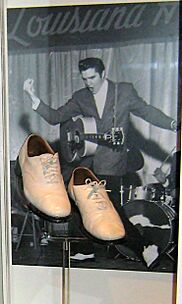
Shreveport was home to the Louisiana Hayride radio show. This show was broadcast weekly from the Shreveport Municipal Memorial Auditorium. From 1948 to 1960, the Hayride helped start the careers of many famous musicians. These included Hank Williams and Elvis Presley, who first performed on radio here.
In the 1990s, Shreveport became known for its rap music scene. It earned the nickname Ratchet City. The term was first used by the group Lava House in their 1999 song "Ratchet."
During the September 11, 2001 attacks, President George W. Bush was taken to the nearby Barksdale Air Force Base.
Shreveport's Location and Look
Where is Shreveport Located?
Shreveport is in Northwest Louisiana. It is the center of the Ark-La-Tex region, where Arkansas, Louisiana, and Texas meet. It's also part of the I-20 Cyber Corridor. This corridor connects tech-focused cities like Dallas–Fort Worth and Atlanta.
Shreveport is about 188 miles from Dallas, Texas. It is 215 miles from Little Rock, Arkansas. The city is also 250 miles from Louisiana's capital, Baton Rouge. Its location makes it a key transportation hub for North Louisiana and the Ark-La-Tex area.
Shreveport is the main city of Caddo Parish. Parts of the city also reach into Bossier Parish, next to Bossier City. Shreveport is built on low ground overlooking the Red River. The western and northern parts of the city are about 253 feet above sea level. The areas outside the city have pine forests, cotton fields, wetlands, and waterways. The city covers about 123.396 square miles. About 107.798 square miles are land, and 15.548 square miles are water.
What Does Shreveport Look Like?
Since the mid-1990s, Shreveport has become a major gambling center with a small downtown skyline. The "Streetscape" project made downtown Shreveport look nicer. It added brick sidewalks, statues, and mosaics. The O.K. Allen Bridge (Texas Street bridge) was lit up with neon lights.
Downtown Shreveport has seen more improvements since the 2010s. Roads across the city have been upgraded. In 2018, buildings downtown and in nearby areas were refreshed. This was due to new investments in the area. In 2020, plans were announced for a new highway connection and more city improvements.

Shreveport's Neighborhoods
Shreveport has many different areas and neighborhoods. The busiest parts of the city are the Youree Drive area, the Shreveport Downtown Riverfront, and the Highland neighborhood. These busy areas are all in Eastern Shreveport, near the Red River.
- Acadiana Place
- Allendale
- Broadmoor
- Caddo Heights
- Cedar Grove
- Cross Lake
- Dixie Gardens
- Fairfield Heights
- Highland
- Hollywood
- Huntington
- Ingleside
- Lakeside
- Mooretown
- Pierremont
- Queensborough
- Southern Hills
- Stoner Hill
- University Terrace
Shreveport's Weather and Climate
Shreveport has a humid subtropical climate. This means it gets a lot of rain. The average yearly rainfall is over 51 inches. Heavy thunderstorms with rain, hail, strong winds, and tornadoes can happen in spring and summer. Winters are usually mild. There are about 35 days a year with freezing temperatures. Ice and sleet storms are also possible.
Summers are hot and humid. Temperatures often go above 90°F for about 91 days a year. The highest temperature ever recorded was 110°F. The lowest was -5°F. Shreveport has a branch of the National Weather Service. This office gives weather forecasts and warnings for the wider Ark-La-Tex region.
| Climate data for Shreveport, Louisiana (Shreveport Regional Airport), 1991–2020 normals, extremes 1871–present | |||||||||||||
|---|---|---|---|---|---|---|---|---|---|---|---|---|---|
| Month | Jan | Feb | Mar | Apr | May | Jun | Jul | Aug | Sep | Oct | Nov | Dec | Year |
| Record high °F (°C) | 85 (29) |
89 (32) |
92 (33) |
96 (36) |
102 (39) |
104 (40) |
108 (42) |
110 (43) |
109 (43) |
99 (37) |
88 (31) |
84 (29) |
110 (43) |
| Mean maximum °F (°C) | 76.4 (24.7) |
79.1 (26.2) |
84.6 (29.2) |
87.5 (30.8) |
92.4 (33.6) |
96.3 (35.7) |
100.2 (37.9) |
101.4 (38.6) |
98.0 (36.7) |
91.3 (32.9) |
82.2 (27.9) |
77.4 (25.2) |
102.6 (39.2) |
| Mean daily maximum °F (°C) | 58.4 (14.7) |
62.6 (17.0) |
70.4 (21.3) |
77.5 (25.3) |
84.6 (29.2) |
91.1 (32.8) |
94.3 (34.6) |
94.9 (34.9) |
89.6 (32.0) |
79.3 (26.3) |
67.9 (19.9) |
59.9 (15.5) |
77.5 (25.3) |
| Daily mean °F (°C) | 47.9 (8.8) |
51.8 (11.0) |
59.0 (15.0) |
65.9 (18.8) |
74.0 (23.3) |
80.9 (27.2) |
83.9 (28.8) |
84.0 (28.9) |
78.3 (25.7) |
67.4 (19.7) |
56.6 (13.7) |
49.5 (9.7) |
66.6 (19.2) |
| Mean daily minimum °F (°C) | 37.3 (2.9) |
41.0 (5.0) |
47.7 (8.7) |
54.3 (12.4) |
63.5 (17.5) |
70.6 (21.4) |
73.5 (23.1) |
73.0 (22.8) |
67.0 (19.4) |
55.4 (13.0) |
45.3 (7.4) |
39.0 (3.9) |
55.6 (13.1) |
| Mean minimum °F (°C) | 21.2 (−6.0) |
26.3 (−3.2) |
30.4 (−0.9) |
38.3 (3.5) |
49.6 (9.8) |
62.3 (16.8) |
68.0 (20.0) |
65.9 (18.8) |
54.3 (12.4) |
39.0 (3.9) |
28.8 (−1.8) |
24.3 (−4.3) |
19.5 (−6.9) |
| Record low °F (°C) | −2 (−19) |
−5 (−21) |
15 (−9) |
31 (−1) |
39 (4) |
52 (11) |
58 (14) |
53 (12) |
42 (6) |
28 (−2) |
16 (−9) |
5 (−15) |
−5 (−21) |
| Average precipitation inches (mm) | 4.40 (112) |
4.30 (109) |
4.90 (124) |
5.19 (132) |
4.46 (113) |
4.78 (121) |
3.50 (89) |
2.91 (74) |
3.46 (88) |
4.59 (117) |
4.00 (102) |
4.94 (125) |
51.43 (1,306) |
| Average snowfall inches (cm) | 0.2 (0.51) |
0.5 (1.3) |
0.1 (0.25) |
0.0 (0.0) |
0.0 (0.0) |
0.0 (0.0) |
0.0 (0.0) |
0.0 (0.0) |
0.0 (0.0) |
0.0 (0.0) |
0.0 (0.0) |
0.1 (0.25) |
0.9 (2.3) |
| Average precipitation days (≥ 0.01 in) | 9.4 | 9.6 | 9.7 | 7.9 | 9.1 | 8.9 | 7.5 | 6.6 | 6.7 | 7.6 | 8.4 | 9.6 | 101.0 |
| Average snowy days (≥ 0.1 in) | 0.2 | 0.3 | 0.1 | 0.0 | 0.0 | 0.0 | 0.0 | 0.0 | 0.0 | 0.0 | 0.0 | 0.1 | 0.7 |
| Average relative humidity (%) | 72.6 | 69.7 | 67.7 | 69.6 | 73.2 | 73.3 | 72.4 | 71.7 | 73.6 | 71.7 | 73.7 | 74.4 | 72.0 |
| Mean monthly sunshine hours | 158.3 | 172.8 | 213.1 | 231.2 | 267.1 | 297.9 | 317.9 | 300.7 | 249.8 | 235.8 | 176.8 | 158.4 | 2,779.8 |
| Percent possible sunshine | 50 | 56 | 57 | 59 | 62 | 70 | 73 | 73 | 67 | 67 | 56 | 51 | 63 |
| Source: NOAA (sun and relative humidity 1961–1990) | |||||||||||||
Who Lives in Shreveport?
| Historical population | |||
|---|---|---|---|
| Census | Pop. | %± | |
| 1850 | 1,728 | — | |
| 1860 | 2,190 | 26.7% | |
| 1870 | 4,607 | 110.4% | |
| 1880 | 8,009 | 73.8% | |
| 1890 | 11,979 | 49.6% | |
| 1900 | 16,013 | 33.7% | |
| 1910 | 28,015 | 75.0% | |
| 1920 | 43,874 | 56.6% | |
| 1930 | 76,655 | 74.7% | |
| 1940 | 98,167 | 28.1% | |
| 1950 | 127,206 | 29.6% | |
| 1960 | 164,372 | 29.2% | |
| 1970 | 182,064 | 10.8% | |
| 1980 | 206,989 | 13.7% | |
| 1990 | 198,525 | −4.1% | |
| 2000 | 200,145 | 0.8% | |
| 2010 | 199,311 | −0.4% | |
| 2020 | 187,593 | −5.9% | |
| 2023 (est.) | 177,959 | −10.7% | |
| U.S. Decennial Census 2020 Census |
|||
Shreveport's population started at 1,728 in 1850. It grew to its highest point of 206,989 in 1980. In 2020, there were 187,593 people living in the city. There were 73,114 households and 42,775 families.
The average household in Shreveport had 2.4 people. About 39% of households were married couples. Also, 44% of men and 40% of women in the city had never been married.
There were 89,523 housing units in Shreveport. About 85% of these were occupied. Of the occupied homes, 54% were owned by the people living in them. Most homes (73%) were single-family houses. The average value of an owned home was $151,700.
The average income for a household in Shreveport was $40,809 in 2020. For families, the average income was $54,023. About 24.9% of Shreveport's population lived below the poverty line.
Different Backgrounds in Shreveport
| Race / Ethnicity (NH = Non-Hispanic) | Pop 2000 | Pop 2010 | Pop 2020 | % 2000 | % 2010 | % 2020 |
|---|---|---|---|---|---|---|
| White alone (NH) | 91,857 | 79,693 | 66,138 | 45.90% | 39.98% | 35.26% |
| Black or African American alone (NH) | 101,218 | 108,535 | 104,612 | 50.57% | 54.46% | 55.77% |
| Native American or Alaska Native alone (NH) | 568 | 652 | 573 | 0.28% | 0.33% | 0.31% |
| Asian alone (NH) | 1,577 | 2,600 | 3,031 | 0.79% | 1.30% | 1.62% |
| Pacific Islander alone (NH) | 58 | 89 | 102 | 0.03% | 0.04% | 0.05% |
| Some Other Race alone (NH) | 136 | 213 | 668 | 0.07% | 0.11% | 0.36% |
| Mixed Race or Multi-Racial (NH) | 1,625 | 2,511 | 5,811 | 0.81% | 1.26% | 3.10% |
| Hispanic or Latino (any race) | 3,106 | 5,018 | 6,658 | 1.55% | 2.52% | 3.55% |
| Total | 200,145 | 199,311 | 187,593 | 100.00% | 100.00% | 100.00% |
In 2019, most people in Shreveport were Black or African American (56.9%). About 36.8% were non-Hispanic white. Other groups included Asian (1.7%) and Hispanic and Latino American (2.6%).
By the 2020 census, Shreveport remained a mostly Black and African American city (55.77%). The number of non-Hispanic white residents slightly decreased to 35.26%. The number of people identifying as multiracial or another race increased to 3.45%. The city also saw growth in its Hispanic and Latino, and Asian American populations.
Religion in Shreveport
Christianity is the main religion in Shreveport. The city is part of the Bible Belt. For a long time, most residents were Protestant. Today, Baptists are the largest group of Christians. They are followed by Methodists and Roman Catholics.
Many Baptist and Methodist churches are part of evangelical Protestant groups. Some are also part of mainline Protestant groups. The largest Baptist groups in the city include the Southern Baptist Convention and the National Baptist Convention (USA). Methodists are mainly part of the African Methodist Episcopal Church or Christian Methodist Episcopal Church. The Roman Catholic community is served by the Roman Catholic Diocese of Shreveport.
Some important Baptist churches include Antioch Baptist and Galilee Missionary Baptist. Mount Canaan Missionary Baptist Church was led by civil rights leader Dr. Harry Blake. Galilee was led by Dr. E. Edward Jones, another civil rights leader.
The large First Methodist Church was started in 1884. Its current building was built in 1913. In 2009, its steeple fell during a storm but has since been replaced.
The large Holy Trinity Catholic Church downtown was founded in 1858. It served Irish and German immigrants. The current church building, in Romanesque revival style, dates to 1896. St. Mark's Cathedral, an Episcopal Church, is also very striking. It became the main church for the Episcopal Diocese of Western Louisiana in 1990.
Shreveport Community Church is an evangelical church. It runs Evangel Christian Academy, a private school for pre-K through 12th grade. The church also puts on a Christmas musical called Songs of the Season.
The Eastern Orthodox Church has been in Shreveport since the early 1900s. The oldest Orthodox church is St. George Greek Orthodox Church.
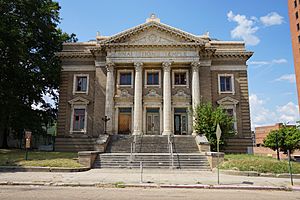
Shreveport's Jewish community started in 1859. B'Nai Zion Temple is the city's Reform synagogue. Agudath Achim is a traditional Jewish synagogue. Shreveport has had three Jewish mayors.
The Islamic community in Shreveport-Bossier made up about 14% of Louisiana's total Muslim population in 2018. Most Muslims in Shreveport are Sunni.
Shreveport's Economy: How People Make a Living
Shreveport used to be a big player in the United States oil business. Standard Oil of Louisiana had offices here. United Gas Corporation, a large oil company, was also based in Shreveport until the 1980s. When the oil and gas industry faced problems, Shreveport's economy was hit hard. Many companies cut jobs or closed. This caused many people to leave the area.
At one time, Shreveport had many factories. These included a General Motors plant that closed in 2012. Other large companies with factories here included General Electric and Western Electric. Today, only Calumet Packaging and Honeywell UOP remain as large manufacturing employers. By 2017, only 5% of jobs in Shreveport were in manufacturing.
Shreveport has now mostly changed to a service economy. The gaming industry has grown quickly. The city has several riverboat gambling casinos. Before Hurricane Katrina in 2005, Shreveport was second only to New Orleans in Louisiana tourism. Nearby Bossier City has Louisiana Downs, a horse racetrack.
Casinos in Shreveport-Bossier include Sam's Town and Margaritaville. The Shreveport-Bossier Convention and Tourist Bureau helps visitors find restaurants, hotels, and attractions.
In 2005, the Louisiana Boardwalk opened in Bossier City. This large shopping and entertainment complex is across from downtown Shreveport. It has outlet stores, restaurants, a movie theater, and a bowling alley.
A large convention center was finished in the Shreveport Downtown Riverfront. It has an 800-space parking garage. A Hilton Hotel next to it opened in 2007.
In 2008, new jobs were expected in the natural gas industry due to the Haynesville Shale area. People in the region received large payments for allowing drilling on their land. While gas prices have changed, drilling activity has increased. The Haynesville is now one of the busiest drilling areas in the U.S.
Companies like JPMorgan Chase, Capital One, and Regions Financial Corporation have offices in Shreveport. AT&T's regional headquarters is downtown. In 2021, Amazon opened a large fulfillment center. This center created 1,000 direct jobs. By October 2023, Amazon planned to open a second facility.
In December 2023, the city council approved a lease for Millennium Studios to rapper 50 Cent's new production company. This studio is now a main filming location for his projects. It also serves as a creative hub for the film industry in Northwest Louisiana.
In 2015, Fortune magazine named Shreveport the "#1 place to start a business."
Shreveport's Film Industry
Louisiana offers tax incentives for films, making it a popular place for moviemaking. It is sometimes called "Hollywood South." Many films have been made in Shreveport. The city has sound stages, prop rental places, and the Louisiana Wave Studio.
Some films shot in Shreveport include:
- The Guardian (2006)
- The Great Debaters (2007)
- Mr. Brooks (2007)
- Premonition (2007)
- The Mist (2007)
- Year One (2008)
- W. (2008)
- Olympus Has Fallen (2013)
- Dark Places (2015)
Several TV shows have also been filmed here, like The Gates (2010) and Salem (2014). The Louisiana Film Prize has led to over 200 short films being made in Shreveport.
Arts and Culture in Shreveport
Shreveport has many theaters, museums, and performing arts groups. These include:
- Academy of Children's Theatre
- Artspace Shreveport
- Barnwell Memorial Garden and Art Center
- Louisiana Dance Theatre
- Louisiana State Exhibit Museum
- Meadows Museum of Art – Centenary College
- Multicultural Center of the South
- R. W. Norton Art Gallery
- River City Repertory Theatre
- RiverView Theatre
- Robinson Film Center
- Shreveport Little Theatre
- Shreveport Metropolitan Ballet
- Shreveport Municipal Auditorium
- Shreveport Opera
- Shreveport Symphony Orchestra
- Southern University Museum of Art
- Spring Street Museum
- The Strand Theatre
- Theatre of the Performing Arts of Shreveport
Fun Events and Festivals
Shreveport hosts many exciting events throughout the year:
- ArtBreak Festival: The largest yearly student arts festival in the South.
- Barksdale Air Force Base Air Show: Held every year since 1933.
- Cinco De Mayo Fiesta: Celebrated annually since 1998.
- Highland Jazz & Blues Festival: Held every November.
- Holiday in Dixie: An annual springtime festival since 1949.
- Independence Bowl: A college football game held every year near New Year's.
- Independence Day Festival: Celebrated every July 4th.
- Let the Good Times Roll Festival: An annual Juneteenth festival.
- Louisiana Film Prize: A short film competition and festival.
- Mardi Gras parades: Colorful parades with krewes.
- Mudbug Madness: A yearly celebration of crawfish in May.
- Red River Balloon Rally: An annual summer hot air balloon festival.
- Red River Revel: A large outdoor arts festival in autumn.
- The State Fair of Louisiana: Held every autumn since 1906.
Mardi Gras Celebrations
Mardi Gras celebrations in Shreveport started in the mid-1800s. They were similar to those in New Orleans. The celebrations stopped during World War I. They were brought back in 1984 with the Krewe of Apollo. Other krewes like Gemini and Centaur followed. Today, Mardi Gras is a big part of Shreveport's culture.
Sports in Shreveport
Independence Stadium has hosted college football games for a long time. Since 1976, it has been home to the yearly Independence Bowl college football game. The Louisiana Tech Bulldogs football team also plays some games here.
Shreveport has had several professional football teams. The Shreveport Steamer played in the World Football League. The Shreveport Pirates played in the Canadian Football League.
Baseball has a long history in Shreveport. The city had Minor League Baseball teams from 1968 to 2002. The Shreveport Captains were a memorable team.
The city also has a history in basketball and soccer. The Shreveport Mudbugs are a Tier II junior ice hockey team. They have played in the North American Hockey League since 2016.
For college sports, the Centenary Gentlemen and Ladies compete in NCAA Division III. The LSU–Shreveport Pilots compete in the NAIA.
Learning in Shreveport: Schools and Colleges
Caddo Public Schools (Louisiana) is the main school district in Shreveport. It serves all of Caddo Parish. C. E. Byrd High School, built in 1925, is named after the district's first superintendent, Clifton Ellis Byrd. There are also private schools in the city, like Loyola College Prep.
Parts of Shreveport in Bossier Parish are served by the Bossier Parish School District.
Colleges and Universities in Shreveport
Shreveport has several colleges:
- Centenary College of Louisiana: A Methodist-affiliated college founded in 1825. It moved to Shreveport in 1908.
- Louisiana State University in Shreveport: Opened in 1967 as a two-year college. It became a four-year university in 1976.
- Louisiana State University Health Sciences Center Shreveport: The only medical school in Northern Louisiana. It opened in 1969.
- Northwestern State University College of Nursing: One of the largest nursing schools in northern Louisiana.
- Louisiana Tech University at Shreveport-Bossier City: Offers programs at its Shreveport Center.
- Southern University at Shreveport (SUSLA): Offers a two-year associate's degree program.
- Louisiana Baptist University and Theological Seminary: Located in Shreveport.
Both Caddo and Bossier parishes are also served by Bossier Parish Community College and Northwest Louisiana Technical Community College.
Other colleges include Ayers Career College, Remington College, and Virginia College. They offer career training in fields like medical and HVAC.
Media and News in Shreveport

Shreveport and its surrounding area have many local newspapers, magazines, and TV and radio stations. The main daily newspaper is The Shreveport Times. The Shreveport Sun is the main African American newspaper in the area.
Across the Red River, Bossier City has its own daily newspaper, Bossier Press-Tribune. The Barksdale Warrior is the weekly newspaper for Barksdale Air Force Base.
For TV and internet, Shreveport is mainly served by Comcast. Bossier City is served by Suddenlink.
Getting Around Shreveport: Transportation
Highways and Roads
Shreveport has a history of public transportation. In the 1870s, people used mule-drawn street cars. These were changed to electric cars by 1890. Commuter rail systems were popular for many years. By the 1930s, buses started to replace trolleys. All trolley service ended in the 1960s.
The Interstate Highway System came to Shreveport in the 1960s with Interstate 20. The city's highway system looks like a cross and a loop. The Outer Loop Freeway (Interstate 220) is in the north. The Inner Loop Freeway (Louisiana Highway 3132) is in the south. These form a semi-loop around downtown. Another loop is the Bert Kouns Industrial Loop (Louisiana Highway 526).
The local public transportation, SporTran, offers bus service throughout Shreveport and Bossier City. Buses run seven days a week on many routes.
Shreveport is also on the path of the planned Interstate 69. This "NAFTA superhighway" will connect Canada, the U.S. Midwest, Texas, and Mexico.
Airports
Shreveport has two airports. The larger one is Shreveport Regional Airport (SHV), opened in 1952. It has flights from Allegiant Air, American Airlines, Delta Air Lines, and United Airlines. The smaller airport, Shreveport Downtown Airport (DTN), was built in 1931. It is north of downtown. It is now used for general aviation, but it was originally Shreveport's main commercial airport.
Railroads
The Shreveport Waterworks Museum has a Shreveport Railroad Museum. It shares the history of railroads in the area.
Until the 1960s, several passenger railroads served the city. These included the Louisiana and Arkansas Railroad and the Texas and Pacific Railway. Other lines included the Illinois Central, Kansas City Southern Railway, St. Louis Southwestern Railway, and the Southern Pacific.
Military Presence in Shreveport
Barksdale Air Force Base is in Bossier Parish, across the river from Shreveport. Shreveport gave the land for its construction in the 1920s. It opened in 1933 and became Barksdale Air Force Base in 1947. It is named after Lt. Eugene Hoy Barksdale, a pioneer army aviator.
Important groups based here include the Air Force Global Strike Command and the 8th Air Force. The main aircraft at Barksdale is the Boeing B-52 Stratofortress. In the past, other famous aircraft like the B-47 Stratojet were also based here.
Shreveport is also home to two 108th Cavalry Squadrons. These are part of the 256th Infantry Brigade. Three of the cavalry troops are at 400 East Stoner Avenue. This historic building is known as "Fort Humbug." It got its name because the Confederate Army once burned logs to look like cannons there. This tricked Union ships into turning back.
Images for kids
See also
 In Spanish: Shreveport para niños
In Spanish: Shreveport para niños
 | Percy Lavon Julian |
 | Katherine Johnson |
 | George Washington Carver |
 | Annie Easley |


